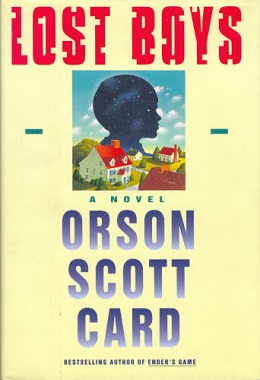
Lost Boys (1992) is a horror novel by American author Orson Scott Card. The premise of the novel revolves around the daily lives of a Mormon family, and the challenges they face after a move to North Carolina. The story primarily follows the family's troubles at work, church, and the oldest child Stevie's difficulty fitting in at school, which lead to him becoming increasingly withdrawn.

Koshchei, also Kashchei often given the epithet "the Immortal", or "the Deathless", is an archetypal male antagonist in Russian folklore.

Baba Yaga is a character from Slavic folklore who has two opposite roles. In some motifs she is described as a repulsive and/or ferocious-looking old woman who fries and eats children, while in others she is a nice old woman, who helps out the hero. According to folklorist Vladimir Propp's folktale morphology, Baba Yaga commonly appears as either a donor or a villain, or may be altogether ambiguous. The distinctive traits of Baba Yaga are flying around in a mortar, wielding a pestle, and dwelling deep in the forest in a hut standing on chicken legs. She also has associations with forest wildlife.

The Tales of Alvin Maker is a series of six alternate history fantasy novels written by American novelist Orson Scott Card, published from 1987 to 2003, with one more planned. They explore the experiences of a young man, Alvin Miller, who realizes he has incredible powers for creating and shaping things around him.

Seventh Son (1987) is an alternate history/fantasy novel by American writer Orson Scott Card. It is the first book in Card's The Tales of Alvin Maker series and is about Alvin Miller, the seventh son of a seventh son. Seventh Son won a Locus Award and was nominated for both the Hugo and World Fantasy Awards in 1988. Seventh sons have strong "knacks", and seventh sons of seventh sons are both extraordinarily rare and powerful. In fact, young Alvin appears to be the only one in the world. His abilities make him the target of the Unmaker, who recognizes Alvin's powers as those of a Maker, only the second ever, and it had been a long time since the first had walked on water and turned water to wine. The Unmaker works largely by water and tries to kill Alvin in his early years before he can master his abilities.

Pastwatch: The Redemption of Christopher Columbus (1996) is a science fiction novel by American writer Orson Scott Card, the first in a proposed Pastwatch series. The book's focus is the life and activities of explorer Christopher Columbus. Much of the action deals with a group of scientists from the future who travel back to the 15th century in order to change the pattern of European contact with the Americas. These alternate with chapters describing Columbus' career and his efforts to obtain backing to his project of travelling across the ocean - much of which can be considered as historical fiction.
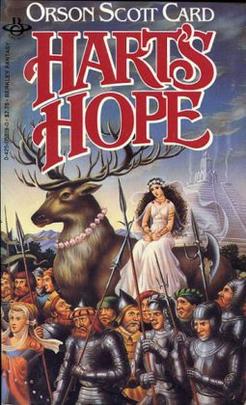
Hart's Hope (1983) is a fantasy novel by American writer Orson Scott Card, written in second person.
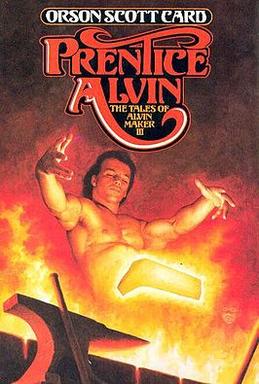
Prentice Alvin (1989) is an alternate history/fantasy novel by American writer Orson Scott Card. It is the third book in Card's The Tales of Alvin Maker series and is about Alvin Miller, the seventh son of a seventh son. Prentice Alvin won the Locus Award for Best Fantasy Novel in 1990, was nominated for the Nebula Award for Best Novel in 1989, and the Hugo Award for Best Novel in 1990.

Alvin Journeyman (1995) is an alternate history/fantasy novel by American writer Orson Scott Card. It is the fourth book in Card's The Tales of Alvin Maker series and is about Alvin Miller, the seventh son of a seventh son. Alvin Journeyman won the Locus Award for Best Fantasy Novel in 1996.

Bartok the Magnificent is a 1999 American direct-to-video animated adventure comedy film directed by Don Bluth and Gary Goldman. It is a spin-off to the 1997 film Anastasia which was also directed by Bluth and Goldman.

Lovelock is a 1994 science fiction novel by American writers Orson Scott Card and Kathryn H. Kidd. The novel's eponymous narrator, a sentient monkey, takes his name from James Lovelock, the scientist-inventor who formulated the Gaia hypothesis, which figures heavily in the book.
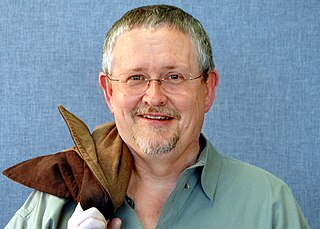
Orson Scott Card is an American writer known best for his science fiction works. He is the first and only person to win a Hugo Award and a Nebula Award in consecutive years, winning both awards for his novel Ender's Game (1985) and its sequel Speaker for the Dead (1986). A feature film adaptation of Ender's Game, which Card co-produced, was released in 2013. Card also wrote the Locus Fantasy Award-winning series The Tales of Alvin Maker (1987–2003).
"Prentice Alvin and the No-Good Plow" is a poem by Orson Scott Card. The poem was the basis for Card's The Tales of Alvin Maker series.
Edmund R. Schubert is an American author and editor best known for his work in the fields of science fiction and fantasy, though some of his short stories are mysteries, including one that was a preliminary nominee for an Edgar Award in 2006 for Best Short Story. In 2015 he was nominated for the Hugo Award for Best Editor but subsequently withdrew himself from consideration due to the block voting tactics which had been used to shape the ballot, stating that "I can't in good conscience complain about the deck being stacked against me, and then feel good about being nominated for an award when the deck gets stacked in my favor. That would make me a hypocrite." He has also written for and edited several business magazines.
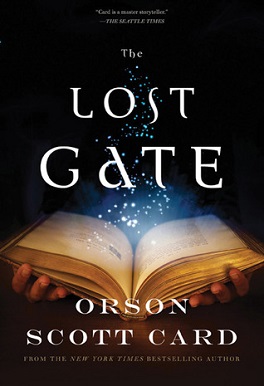
The Lost Gate is a fantasy novel by Orson Scott Card. It is the first novel in the Mither Mages trilogy. The second novel is The Gate Thief and the third one is Gatefather.

The Last Shadow is a 2021 science fiction novel by American writer Orson Scott Card, part of his Ender's Game series. It links the Shadow Saga back to the original Ender series. This book brings the two series back together, and wraps up some of the plot threads left dangling in Shadow of the Giant. The events in the book follow those in Children of the Mind, the final book in the Ender series.
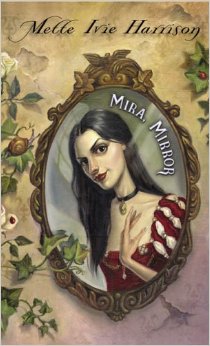
Mira, Mirror is a 2004 young adult fantasy novel written by Mette Ivie Harrison. The story of the novel is told from the viewpoint of the magic mirror from the fairy tale "Snow White". "Mira" is a main character.
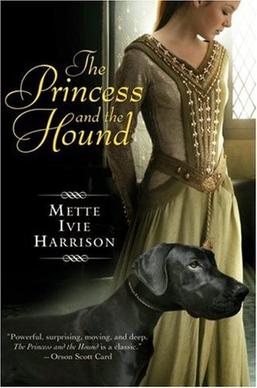
The Princess and the Hound is a young adult, fantasy novel written by Mette Ivie Harrison. The book was first published in 2007 by HarperCollins.

The Last Knight, also known as The Last Warrior is a 2017 Russian fantasy comedy film directed by Dmitriy Dyachenko. The story develops around Baba Yaga and Koschei, both villains in traditional Russian fairy tales. The film was produced by American film companies The Walt Disney Company CIS with Russian film companies Yellow, Black and White and Kinoslovo. The film stars Viktor Khorinyak, Mila Sivatskaya, Elena Yakovleva, Ekaterina Vilkova, Konstantin Lavronenko and Yevgeny Dyatlov.

The Last Warrior: Root of Evil is a 2021 Russian fantasy comedy film, a sequel to the 2017's The Last Warrior . The film is directed by Dmitry Dyachenko, and produced by The Walt Disney Company CIS, The Walt Disney Company's subsidiary in Russia, in collaboration with the Russian production company Yellow, Black and White.

















